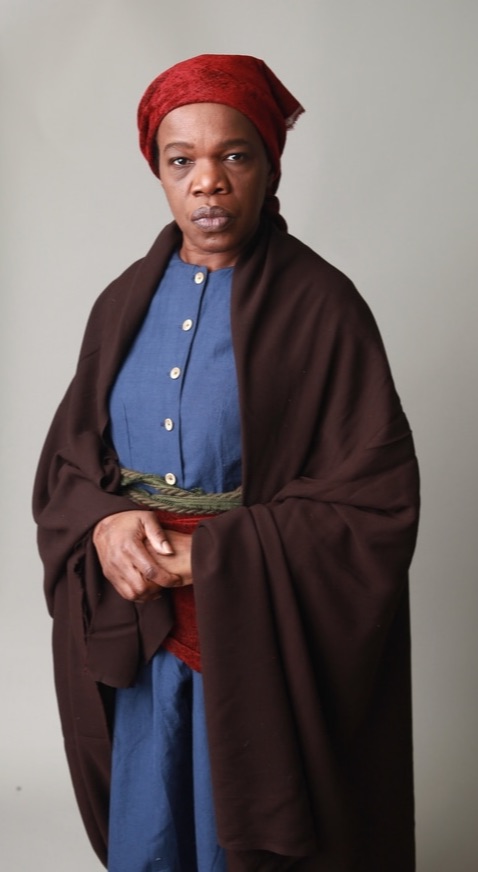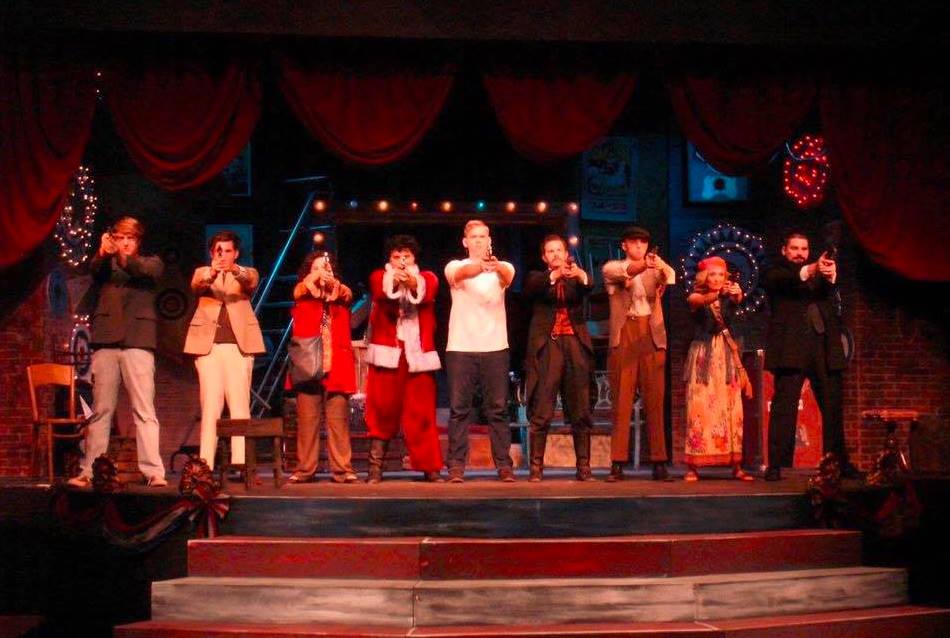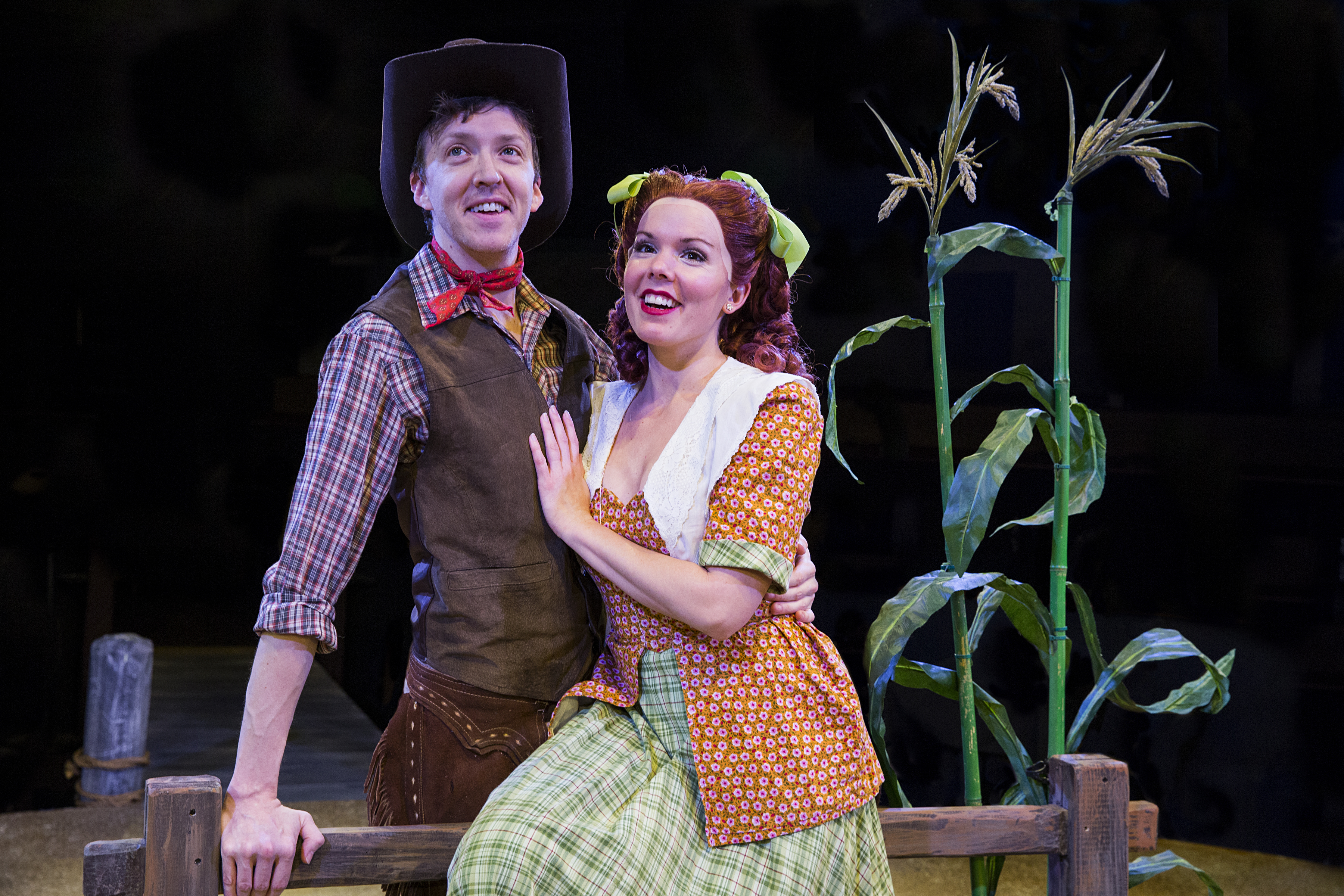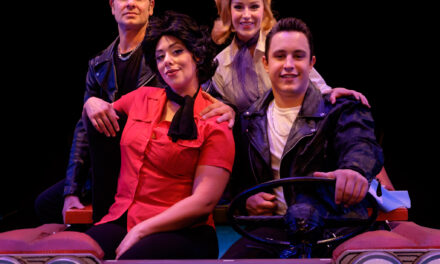Sheryl Rouse Crawford in Mean to Be Free. Photo courtesy Faithworks Studios.
Mean to Be Free
By Joanna Kraus
Directed by Rush Trowel
Review by Keith Waits
Entire contents copyright © 2017 by Keith Waits. All rights reserved.
Joanna Kraus’s Mean to Be Free tells the familiar story of Harriet Tubman, the woman who stands for the Underground Railroad. The woman called “Moses” shepherded an estimated 70 refuge slaves to freedom in 13 arduous journeys through a tenuous network of contacts and safe houses between the Deep South and Canada in the years before the American Civil War.
Kraus has fashioned a straightforward, fictional tale of one of those journeys, with Tubman leading two children, Hedy and Tom (Irena Marie Fletcher and Jeremiah Dow), and two adults, Joe and Linda (Alphaeus Green, Jr. and Rebekah Dow), one of which has a $1000 bounty on their head. Along the way they are helped by Thomas Garrett (Blake Cox), a Quaker abolitionist who displays courage equal to Tubman, and chased by two men (R. Edin Dawson and John C. Collins) who make their living capturing escaped slaves.
The play is a solid, if unimaginative, tribute to the legacy of one of the great American heroes, a figure so deserving of celebration that she was selected to become the first woman and African American to appear on U.S. paper currency. But I do wish the playwright had attempted to tell us something about Tubman beyond the iconic story; how during the Civil War she worked for the Union Army in various capacities, including as a spy; how she was the first woman in America to lead a military action; how she was a key figure in the Women’s Suffrage movement. But the author keeps his narrative simple, and his characterization of Tubman is also monolithic, and I guess that will do. Courageous, tenacious, unyielding – and deeply spiritual; if Mean to Be Free accomplishes nothing more than reinforce this understanding of the historical figure, then it is worthwhile.
The impact of the production owes a great deal to the music, which is so fully grounded in gospel tradition that it ostensibly turns the spacious Grand Theater into a church. A chorus positioned in front of the stage mostly accompanies the onstage action like a movie soundtrack, but sometimes it rises to lead the action and deliver emotional depth to the piece. It is the second most important choice Trowell has made as producer/director.
The first was casting Sheryl Rouse Crawford in the title role. Primarily known as a singer, Crawford’s voice takes flight with such power that you wish she had been given more than two songs, and her performance captures Trowell’s iconic vision of the character with focused energy and determination.
As the Quaker, Garrett, Blake Cox also makes quite a strong impression, with a voice to match Crawford’s in a number entitled, “My God is So High.” Jeremiah Dow and Irena Marie Fletcher do well as the kids, and much of the humor in the script is placed among the four refugees, with Alphaeus Green, Jr. providing a solidly professional presence, and Rebekah Lynn Dow earning laughs with a comically defeatist characterization. The success of this particular journey north owes nothing to Linda’s profound lack of hopefulness.
R. Edin Dawson and John C. Collins are suitably threatening as the slave hunters, and Jake Minton is slyer than you would expect in his very brief role as the conductor on a real train to Canada. It is undoubtedly historically accurate, but the use of an actual railroad is also a neat story device.
The limited sets were effective enough, although the continual repositioning of a tree prompted some titters in the audience, and a couple of scenes were placed deeply enough that they were not visible from some of the seating on the edges. As a director, Trowel’s blocking otherwise tended to place the action on an even plane to the audience, which gave the production the feel of a school pageant. Given the overtly didactic and ecclesiastical tone of the material, it doesn’t seem altogether inappropriate, but I couldn’t help but feel that the level of talent available onstage was capable of more.
Mean to Be Free triumphs in its simple goal of celebrating the historical figure, and was greeted warmly by a sold out house in the 600-seat Grand Theater. It may seem unfortunate that there were only two performances scheduled on one day, but if those two shows can pull in more than 1000 patrons, that’s a number that would be the envy of many other local companies working 6-8 performances over two weeks in houses with a capacity of less than 200. Faith Works Studios knows how to market unabashedly spiritual theatre very directly to Louisville’s Black population with great success.
Mean to Be Free
February 26, 2017
Faith Works Studios
The Grand Theater
Woman’s Club of Louisville
1320 South 4th Street
Louisville, KY 40204
faithworks-studios.com
Keith Waits is a native of Louisville who works at Louisville Visual Art during the days, including being the host of PUBLIC on WXOX-FM 97.1/ ARTxFM.com, but spends most of his evenings indulging his taste for theatre, music and visual arts. His work has appeared in Pure Uncut Candy, TheatreLouisville, and Louisville Mojo. He is now Managing Editor for Arts-Louisville.com.





